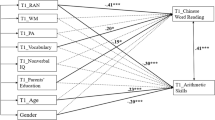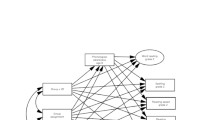Abstract
In this article we review findings from a recent longitudinal study of the contribution of phonological working memory to vocabulary acquisition and reading development. A total of 80 children were tested initially at school entry at the age of four years, and were tested in three further waves at ages 5, 6, and 8 years. The results indicate that phonological memory skills constrain vocabulary growth during the first year or so in school but that subsequently, vocabulary knowledge is a pacemaker in the development relationship with memory. Phonological memory skill in prereading children was found to be significantly linked with scores on a reading test at age 8 which encourages the use of a phonological recoding strategy. The theoretical and practical implications of the findings, and important areas for future research, are discussed.
Similar content being viewed by others
References
Adams, A.-M., & Gathercole, S. E. (in prep.).Developmental associations between speech production and phonological working memory.
Aram, D. M., & Nation, J. E. (1975). Patterns of language behaviour in children with developmental language disorders.Journal of Speech & Hearing Research, 18, 229–2411.
Baddeley, A. D. (1978). Working memory and reading. In P. A. Kolers, M. E. Wrolstad, & H. Bouma (Eds.),Processing of Visible Language, Vol. 1, (pp. 355–370). New York: Plenum Press.
Baddeley, A. D. (1986).Working Memory. Oxford: Oxford University Press.
Baddeley, A. D., & Gathercole, S. E. (1992). Learning to read: The role of the phonological loop. In J. Alegria, D. Holander, J. J. de Morais, & M. Radeau (Eds.),Analytic Approaches to Human Cognition, (pp. 153–168). Elsevier.
Baddeley, A. D., & Hitch, G. J. (1974). Working memory. In G. Bower (Ed.),The Psychology of Learning and Motivation, Vol. 8, 47–90.
Baddeley, A. D., Papagno, C., & Vallar, G. (1988). When long-term learning depends on short-term storage.Journal of Memory & Language, 27, 586–596.
Baddeley, A. D., Thomson, N., & Buchanan, M. (1975). Word length and the structure of short-term memory.Journal of Verbal Learning & Verbal Behavior, 14, 575–589.
Benton, A. (1978). The cognitive functioning of children with developmental aphasia. In M. Wyke (Ed.),Developmental Dysphasia. New York: Academic Press.
Bishop, D. (1982).Test for the Reception of Grammar. Available from the author at MRC Applied Psychology Unit, Cambridge, UK.
Bird, J. (1981).The auditory perception, phonemic awareness and literacy skills of phonologically disordered children. Unpublished PhD thesis from the University of Manchester.
Bradley, L., & Bryant, P. E. (1978). Difficulties in auditory organization as a possible cause of reading backwardness.Nature, 271, 746–747.
Bradley, L., & Bryant, P. E. (1983). Categorizing sounds and learning to read — a causal connection.Nature, 301, 419–420.
Bryant, P. E., Maclean, M., Bradley, L., & Crossland, J. (1990). Rhyme and alliteration, phoneme detection, and learning to read.Developmental Psychology, 26, 429–438.
Byrne, B., & Fielding-Barnsley, R. (1989). Phonemic awareness and letter knowledge in the child’s acquisition of the alphabetic principle.Journal of Educational Psychology, 81, 313–321.
Crano, W. D., & Mellon, P. M. (1978). Causal influence of teachers’ expectations on children’s academic performance: A cross-lagged panel analysis.Journal of Educational Psychology, 70, 39–49.
Cunningham, A. E., & Stanovich, K. E. (1991). Tracking the unique effects of print exposure in children: Associations with vocabulary, general knowledge and spelling.Journal of Educational Psychology, 83, 264–274.
Elliott, C. D. (1983).British Abilities Scales. Windsor: NFER-Nelson Publishing Company Ltd.
Ellis, N., & Large, B. (1988). The early stages of reading: A longitudinal study.Applied Cognitive Psychology, 2, 47–76.
Ericsson, K. A., & Chase, W. G. (1982). Exceptional memory.American Scientist, 70, 607–615.
France, N. (1981).Primary Reading Test (Revised Edition). NFER-Nelson Publishing Company Ltd: Windsor.
Gathercole, S. E., & Adams, A.-M. (1993). Phonological working memory in very young children.Developmental Psychology, 29.
Gathercole, S. E., & Baddeley, A. D. (1989). Evaluation of the role of phonological STM in the development of vocabulary in children: A longitudinal study.Journal of Memory & Language, 28, 200–213.
Gathercole, S. E., & Baddeley, A. D. (1990a). Phonological memory deficits in language disordered children: Is there a causal connection?Journal of Memory & Language, 29, 336–360.
Gathercole, S. E., & Baddeley, A. D. (1990b). The role of phonological memory in vocabulary acquisition: A study of young children learning arbitrary names of toys.British Journal of Psychology, 81, 439–454.
Gathercole, S. E., & Baddeley, A. D. (1993).Working Memory and Language Processing. Hove: Lawrence Erlbaum Associates.
Gathercole, S. E., Willis, C. S., & Baddeley, A. D. (1991). Differentiating phonological memory and awareness of rhyme: Reading and vocabulary development in children.British Journal of Psychology, 82, 387–406.
Gathercole, S. E., Willis, C., Emslie, H., & Baddeley, A. (1991). The influences of number of syllables and word-likeness on children’s repetition of nonwords.Applied Psycholinguistics, 12, 349–367.
Gathercole, S. E., Willis, C., Emslie, H., & Baddeley, A. (1992). Phonological memory and vocabulary development during the early school years: A longitudinal study.Developmental Psychology, 28, 887–898.
Gathercole, S. E., Willis, C. S., Emslie, H., & Baddeley, A. D. (in prep.).Phonological memory skill in prereading children as a predictor of later reading achievement.
Graham, N. C. (1980). Memory constraints in language deficiency. In F. Margaret Jones (Ed.),Language Disability in Children, (pp. 69–94). Baltimore: University Park Press.
Hulme, C., Thomson, N., Muir, C., & Lawrence, A. (1984). Speech rate and the development of short-term memory span.Journal of Experimental Child Psychology, 38, 241–253.
Jorm, A. (1983). Specific reading retardation and working memory: A review.British Journal of Psychology, 74, 311–342.
Kirchner, D., & Klatzky, R. L. (1985). Verbal rehearsal and memory in language-disordered children.Journal of Speech & Hearing Research, 28, 556–565.
Leonard, L. B. (1982). Phonological deficits in children with developmental language impairment.Brain & Language, 16, 73–86.
Liberman, A. M., & Mattingley, I. G. (1985). The motor theory of speech perception revisited.Cognition, 21, 1–36.
Liberman, I. Y., Shankweiler, D., Fischer, F. W., & Carter, B. (1974). Explicit syllable and phoneme segmentation in the young child.Journal of Experimental Child Psychology, 18, 201–212.
Lindblom, B. (1989). Some remarks on the origin of the phonetic code. In A. von Euler, I. Lundberg & G. Lennerstrand (Eds.),Brain and Reading, (pp. 27–44). Stockton Press.
Locke, J. L., & Scott, K. K. (1979). Phonetically mediated recall in the phonetically disordered child.Journal of Communication Disorders, 12, 125–131.
Mann, V. A. (1984). Longitudinal prediction and prevention of early reading difficulty.Annals of Dyslexia, 34, 117–136.
Mann, V. A., & Liberman, I. Y. (1984). Phonological awareness and verbal short-term memory.Journal of Learning Disabilities, 17, 592–599.
Morais, J., Cary, L., Alegria, J., & Bertelson, P. (1979). Does awareness of speech as a sequence of phones arise spontaneously?Cognition, 7, 323–331.
Neale, M. (1989).Neale Analysis of Reading Abilities (Revised British Edition). Windsor: NFER Nelson.
Nicolson, R. (1981). The relationship between memory span and processing speed. In M. Friedman, J. P. Das, & N. O’Connor (Eds.),Intelligence and Learning, (pp. 179–184). Plenum Press.
Paivio, A. (1971).Imagery and Verbal Processes. New York: Holt, Rinehart and Winston.
Papagno, C., Valentine, T., & Baddeley, A. (1991). Phonological short-term memory and foreign-language vocabulary learning.Journal of Memory & Language, 30, 331–347.
Service, E, (1992). Phonology, working memory and foreign-language learning.Quarterly Journal of Experimental Psychology, 45A, 21–50.
Shankweiler, D., Liberman, I. Y., Mark, L. S., Fowler, C. A., & Fischer, F. W. (1979). The speech code and learning to read.Journal of Experimental Psychology: Human Learning & Memory, 5, 531–545.
Stark, R., & Tallal, P. (1981). Selection of children with specific language deficits.Journal of Speech and Hearing Disorders, 46, 114–122.
Taylor, H. G., Lean, D., & Schwartz, S. (1989). Pseudoword repetition ability in learning-disabled children.Applied Psycholinguistics, 10, 203–219.
Wagner, R. K., & Torgesen, J. K. (1987). The nature of phonological processing and its causal role in the acquisition of reading skills.Psychological Bulletin, 101, 192–212.
Wechsler, D. (1974).Manual for the Wechsler Intelligence Scale for Children — Revised. New York: Psychological Corporation.
Wiig, E., & Semel, E. M. (1976).Language Disabilities in Children and Adolescents. Columbus, OH: Charles E. Merrill.
Author information
Authors and Affiliations
Additional information
The research reported in this article was supported by the Medical Research Council and the Economic and Social Research Council. Requests for reprints should be sent to Susan E. Gathercole, University of Bristol, 8 Woodland Road, Bristol BS8 1TN, UK.
Rights and permissions
About this article
Cite this article
Gathercole, S.E., Baddeley, A.D. Phonological working memory: A critical building block for reading development and vocabulary acquisition?. Eur J Psychol Educ 8, 259–272 (1993). https://doi.org/10.1007/BF03174081
Received:
Issue Date:
DOI: https://doi.org/10.1007/BF03174081




